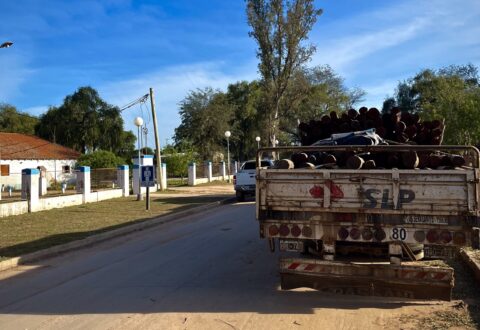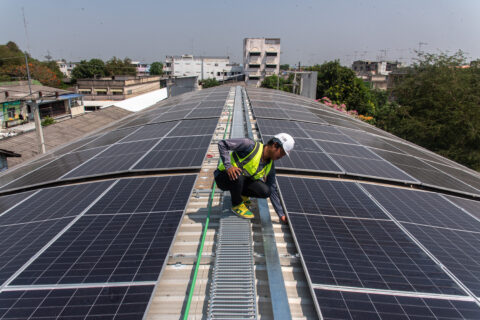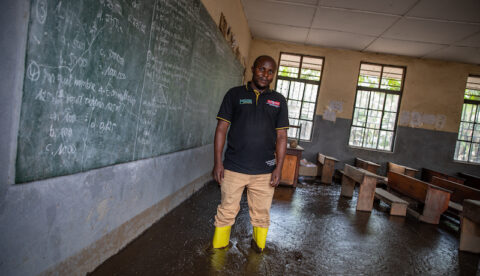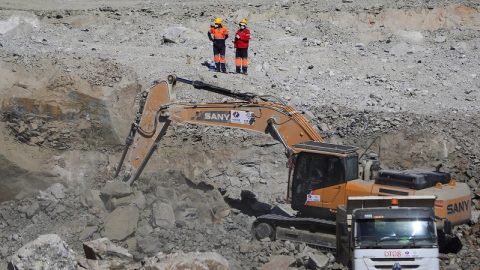Governments have again failed to agree on a schedule for producing key climate science reports as deep divergences blocked progress at a meeting of the U.N.’s Intergovernmental Panel on Climate Change (IPCC) last week.
At the talks in Sofia, Bulgaria, most countries supported a faster process that would see three flagship reports assessing the state of climate science delivered by mid-2028, in time for the next global stocktake – the UN’s scorecard of collective climate action.
But a group of high-emitting developing countries made up of China, India, Saudi Arabia, Russia and South Africa – backed by Kenya – opposed an accelerated timeline, citing concerns that it would be harder to include scientists from the Global South, three sources present at the talks told Climate Home.
Governments were unable to reach a decision for the second time this year after “fraught talks” in January ended with the same outcome. The issue will be debated again at the next gathering in February 2025, while a separate expert meeting is tasked with drafting the outline of those reports by the end of 2024.
Fight over climate science
Adão Soares Barbosa, IPCC representative for Timor-Leste within the Least Developed Countries (LDCs) group, expressed his disappointment over the lack of agreement in Sofia resulting from “strong polarisation in the room”.
“If the assessment reports are not able to feed information into the global stocktake process, what are they good for?” he said, speaking to Climate Home.
Joyce Kimutai, who represented Kenya at the Sofia talks, said her country’s opposition to the proposed shortened timeline was “absolutely not intended to frustrate the process” but to highlight the challenges countries with more limited resources would be facing.
“With such a tight timeline, it is likely that we will produce a report that is not comprehensive, not robust. We found that very problematic,” she told Climate Home on Monday.

IPCC delegates exchange views in an informal huddle in Sofia, Bulgaria. Photo: IISD/ENB | Anastasia Rodopoulou
The primary purpose of the IPCC is to provide credible scientific assessments to the UN’s climate body (UNFCCC) and national decision-makers. The findings of its reports – which are usually compiled over several years by scientists working on a voluntary basis around the world – have been highly influential. They synthesise the latest research on climate change, as well as efforts to curb planet-heating emissions and adapt to the impacts of global warming.
The sixth series, whose final report was issued in March 2023, played a prominent role in informing the first UNFCCC global stocktake which resulted in governments agreeing for the first time to begin “transitioning away from fossil fuels” at COP28 in Dubai last December.
But some fossil fuel-rich countries like Saudi Arabia – which have pushed back against clear language on the need to cut production – have previously opposed strong recognition of IPCC reports in UNFCCC negotiations.
The UN climate body has officially requested that its scientific counterpart align its activities with the timeline of the next global stocktake. The IPCC’s input will be “invaluable” for the international review of climate action, Simon Stiell, chief of the UN climate body, told the IPCC meeting in January.
Reputation ‘at risk’
As he opened the session in Sofia, the IPCC chair Jim Skea warned of a “complex and testing” agenda.
The discussion over the report production schedule would have “far-reaching implications in terms of the timeliness of our products, and the inclusivity of both our own processes and the science that is being assessed”, he added.
Scientists and government officials were presented with a proposal drafted by the IPCC secretariat – its administrative arm – which would see the assessment reports completed between May and August 2028. That would be a few months before the global stocktake process is scheduled to end in November 2028.
The IPCC must produce its flagship report in time for the next UN global stocktake
A majority of countries, including EU member states, the UK, the US and most vulnerable developing nations, supported the proposal, stressing the importance of the scientific reports feeding into the global stocktake, according to sources and a summary of discussions by the IISD’s Earth Negotiations Bulletin. Many supporters added that the IPCC’s reputation would otherwise be at risk.
Small island states and least-developed countries argued that IPCC input is crucial for those that lack capacity to produce their own research and are most vulnerable to the immediate impacts of climate change, according to the IISD summary.
But a dozen developing countries – with India, Saudi Arabia and China being the most vocal – opposed speeding up the process, arguing that more time is needed to ensure greater inclusion of experts and research from the Global South, which would result in “robust and rigorous” scientific output.
South Africa, Russia, Kenya, Algeria, Burundi, Congo, Jordan, Libya and Venezuela expressed similar views, according to IISD.
More time for more voices
India said that “producing the best science needs time, haste leads to shoddy work”, while Saudi Arabia claimed that the shortened timeline would “lead to incomplete science and would be a disservice to the world”, according to the IISD summary of the discussions.
Kenya’s Kimutai told Climate Home that producing scientific literature and reviewing submissions takes a lot of time and, unlike their counterparts in richer countries, scientists in the Global South can rarely count on the help of junior researchers at well-funded institutions.
“We love this process – we find it important,” she added, “but we’re trying to say that, while it may be an easy process in other regions, it is not for us”.
As first airline drops goal, are aviation’s 2030 targets achievable without carbon offsets?
The IPCC has long struggled with ensuring adequate representation of expert voices from the Global South. Only 35% of the authors working on its sixth and latest assessment report hailed from developing countries, according to a study published in the journal Climate, up from 31% in the previous cycle.
In Sofia, several delegates pointed out that the IPCC is working to improve inclusivity and that a slight extension of the schedule would not be the solution. Similar views were aired by forty IPCC authors from developing countries in a letter circulated ahead of last week’s talks, urging countries to ensure that the reports are ready in time for the global stocktake.
While recognising concerns over the inclusion of under-represented communities, they argued that it would not be achieved by allowing more time but through “deliberate efforts to counterbalance long-standing inequalities” in the research world.
Writing for Climate Home, Malian scientist Youba Sokona, one of the letter’s authors, warned that the IPCC risks losing its relevance and influence over global climate policy-making if its output cannot be used in the global stocktake.
Despite lengthy exchanges, scientists in Sofia could not find a solution and decided to postpone a decision on the timeline until the next IPCC session in February 2025, when countries will also need to agree on the outline of the reports’ content.
Kenya’s Kimutai has proposed a compromise that would see reports on adaptation and mitigation completed in time for the global stocktake, with a third on the physical science of climate change coming in later.
Richard Klein, a senior researcher at the Stockholm Environment Institute (SEI) and a lead author of previous IPCC reports, told Climate Home the ongoing row was “problematic”. “With these delays, a shorter [report] cycle in time for the global stocktake may not be feasible anymore, which in turn makes it less likely we will see ambitious nationally-determined contributions (NDCs) after that process,” he warned.
Expert scientists from the IPCC will meet again this December at a “scoping” session to sketch out a framework for what the assessment reports should include.
Barbosa of Timor-Leste is worried that those discussions will also become “heavily politicised”.
“We are concerned that high-emitting developing countries will try water down the work on emission-cutting measures and keep out strong messages on things like the need to phase out fossil fuels,” he told Climate Home.
(Reporting by Matteo Civillini; editing by Megan Rowling)
The post IPCC’s input into key UN climate review at risk as countries clash over timeline appeared first on Climate Home News.
IPCC’s input into key UN climate review at risk as countries clash over timeline
Climate Change
Colombia proposes expert group to advance talks on minerals agreement
Colombia wants countries to discuss options for a global agreement to ensure that the extraction, processing and recycling of minerals – including those needed for the clean energy transition – don’t harm the environment and human wellbeing.
The mineral-rich nation is proposing to create an expert group to “identify options for international instruments, including global and legally-binding instruments, for coordinated global action on the environmentally sound management of minerals and metals through [their] full lifecyle”.
Colombia hopes this will eventually lead to an agreement on the need for an international treaty to define mandatory rules and standards that would make mineral value chains more transparent and accountable.
The proposal was set out in a draft resolution submitted to the UN Environment Assembly (UNEA) earlier this week and seen by Climate Home News. UNEA, which is constituted of all UN member states, is the world’s top decision-making body for matters relating to the environment. The assembly’s seventh session will meet in Kenya in December to vote on countries’ proposals.
Soaring demand for the minerals used to manufacture clean energy technologies and electric vehicles, as well as in the digital, construction and defence industries have led to growing environmental destruction, human rights violations and social conflict.
Colombia argues there is an “urgent need” to strengthen global cooperation and governance to reduce the risks to people and the planet.
Options for a global minerals agreement
The proposal is among a flurry of initiatives to strength global mineral governance at a time when booming demand is putting pressure on new mining projects.
Colombia, which produces emeralds, gold, platinum and silver for exports, first proposed the idea for a binding international agreement on minerals traceability and accountability on the sidelines of the UN biodiversity talks it hosted in October 2024.
Since then, the South American nation has been quietly trying to drum up support for the idea, especially among African and European nations.
Its draft resolution to UNEA7 contains very few details, leaving it open for countries to discuss what kind of global instrument would be best suited to make mineral supply chains more transparent and sustainable.
Does the world need a global treaty on energy transition minerals?
Colombia says it wants the expert group to build on other UN initiatives, including a UN Panel on Critical Energy Transition Minerals, which set out seven principles to ensure the mining, processing and recycling of energy transition minerals are done responsibly and benefit everyone.
The group would include technical experts and representatives from international and regional conventions, major country groupings as well as relevant stakeholders.
It would examine the feasibility and effectiveness of different options for a global agreement, consider their costs and identify measures to support countries to implement what is agreed.
The resolution also calls for one or two meetings for member states to discuss the idea before the UNEA8 session planned in late 2027, when countries would decide on a way forward.
No time to lose for treaty negotiations
Colombia’s efforts to advance global talks on mineral supply chains have been welcomed by resource experts and campaigners. But not everyone agrees on the best strategy to move the discussion forward at a time when multilateralism is coming under attack.
Johanna Sydow, a resource policy expert who heads the international environmental policy division of the Heinrich-Böll Foundation, said she had hoped that the resolution would explicitly call for negotiations to begin on an international minerals treaty.
“Treaty negotiations take a long time. If you don’t even start with it now, it will take even longer. I don’t see how in two or three years it will be easier to come to an agreement,” she told Climate Home.
Despite the geopolitical challenges, “we need joint rules to prevent a huge race to the bottom for [mineral] standards”. That could start with a group of countries coming together and starting to enforce joint standards for mining, processing and recycling minerals, she said.
But any meaningful global agreement on mineral supply chains would require backing from China, the world’s largest processor of minerals, which dominates most of the supply chains. And with Colombia heading for an election in May, it will need all the support it can get to move its proposal forward.
‘Voluntary initiative won’t cut it’
Juliana Peña Niño, Colombia country manager at the Natural Resource Governance Institute, is more optimistic. “Colombia’s leadership towards fairer mineral value chains is a welcome step,” she told Climate Home News.
“At UNEA7, we need an ambitious debate that gives the proposed expert group a clear mandate to advance concrete next steps — not delay decisions — and that puts the voices of those most affected at the centre. One thing is clear: the path forward must ultimately deliver a binding instrument, as yet another voluntary initiative simply won’t cut it,” she said.
More than 50 civil society groups spanning Latin America, Africa and Europe previously described Colombia’s work on the issue as “a chance to build a new global paradigm rooted in environmental integrity, human rights, Indigenous Peoples’ rights, justice and equity”.
“As the energy transition and digitalisation drive demand for minerals, we cannot afford to repeat old extractive models built on asymmetry – we must redefine them,” they wrote in a statement.
Main image: The UN Environment Assembly is hosted in Nairobi, Kenya. (Natalia Mroz/ UN Environment)
The post Colombia proposes expert group to advance talks on minerals agreement appeared first on Climate Home News.
Colombia proposes expert group to advance talks on minerals agreement
Climate Change
California Sanctions Stark Disparities in Pesticide Exposure During Pregnancy
If you’re young, pregnant and Latina, chances are you live near agricultural fields sprayed with higher levels of brain-damaging organophosphate pesticides.
A baby in the womb has few defenses against industrial petrochemicals designed to kill.
California Sanctions Stark Disparities in Pesticide Exposure During Pregnancy
Climate Change
DeBriefed 3 October 2025: UK political gap on climate widens; Fossil-fuelled Typhoon Ragasa; ‘Overshoot’ unknowns
Welcome to Carbon Brief’s DeBriefed.
An essential guide to the week’s key developments relating to climate change.
This week
Shattered climate consensus
FRACKING BAN: UK energy secretary Ed Miliband has announced that the government will bring forward its plans to permanently ban fracking, in a move designed to counter a promise from the hard-right Reform party to restart efforts to introduce the practice, the Guardian said. In the same speech, Miliband said Reform’s plans to scrap clean-energy projects would “betray” young people and future generations, the Press Association reported.
ACT AXE?: Meanwhile, Kemi Badenoch, leader of the Conservatives, pledged to scrap the 2008 Climate Change Act if elected, Bloomberg reported. It noted that the legislation was passed with cross-party support and strengthened by the Conservatives.
‘INSANE’: Badenoch faced a backlash from senior Tory figures, including ex-prime minister Theresa May, who called her pledge a “catastrophic mistake”, said the Financial Times. The newspaper added that the Conservatives were “trailing third in opinion polls”. A wide range of climate scientists also condemned the idea, describing it as “insane”, an “insult” and a “serious regression”.
Around the world
- CLIMATE CRACKDOWN: The US Department of Energy has told employees in the Office of Energy Efficiency and Renewable Energy to avoid using the term “climate change”, according to the Guardian.
- FOREST DELAY: Plans for Brazil’s COP30 flagship initiative, the tropical forests forever fund, are “suffer[ing] delays” as officials remain split on key details, Bloomberg said.
- COP MAY BE ‘SPLIT’: Australia could “split” the hosting of the COP31 climate summit in 2026 under a potential compromise with Turkey, reported the Guardian.
- DIVINE INTERVENTION: Pope Leo XIV has criticised those who minimise the “increasingly evident” impact of global warming in his first major climate speech, BBC News reported.
€44.5 billion
The cost of extreme weather and climate change in the EU in the last four years – two-and-a-half times higher than in the decade to 2019, according to a European Environment Agency report covered by the Financial Times.
Latest climate research
- Fossil-fuelled climate change caused around 36% of Typhoon Ragasa’s direct damage to homes and properties in southern China, according to a rapid impact attribution study | Imperial Grantham Institute – Climate Change and the Environment
- Some 86% of the global population are concerned about climate change, according to a survey of 280,000 people in 142 countries and regions | Climate Policy
- A global shift towards a “planetary health diet” could slash emissions and save tens of thousands of lives each day | EAT-Lancet Commission 2025 report
(For more, see Carbon Brief’s in-depth daily summaries of the top climate news stories on Monday, Tuesday, Wednesday, Thursday and Friday.)
Captured

Clean energy has met 100% of Great Britain’s electricity demand for a record 87 hours this year so far, according to new Carbon Brief analysis. This is up from just 2.5 hours in 2021 and 64.5 hours in all of 2024. The longest stretch of time where 100% of electricity demand was met by clean energy stands at 15 hours, from midnight on 25 May 2025 through to 3pm on 26 May, according to the analysis.
Spotlight
‘Overshoot’ unknowns
As the chances of limiting global warming to 1.5C dwindle, there is increasing focus on the prospects for “overshooting” the Paris Agreement target and then bringing temperatures back down by removing CO2 from the atmosphere.
At the first-ever Overshoot Conference in Laxenburg, Austria, Carbon Brief asks experts about the key unknowns around warming “overshoot”.
Sir Prof Jim Skea
Chair of the Intergovernmental Panel on Climate Change (IPCC) and emeritus professor at Imperial College London’s Centre for Environmental Policy
So there are huge knowledge gaps around overshoot and carbon dioxide removal (CDR). As it’s very clear from the themes of this conference, we don’t altogether understand how the Earth would react in taking CO2 out of the atmosphere.
We don’t understand the nature of the irreversibilities and we don’t understand the effectiveness of CDR techniques, which might themselves be influenced by the level of global warming, plus all the equity and sustainability issues surrounding using CDR techniques.
Prof Kristie Ebi
Professor at the University of Washington’s Center for Health and the Global Environment
There are all kinds of questions about adaptation and how to approach effective adaptation. At the moment, adaptation is primarily assuming a continual increase in global mean surface temperature. If there is going to be a peak – and of course, we don’t know what that peak is – then how do you start planning? Do you change your planning?
There are places, for instance when thinking about hard infrastructure, [where overshoot] may result in a change in your plan – because as you come down the backside, maybe the need would be less. For example, when building a bridge taller. And when implementing early warning systems, how do you take into account that there will be a peak and ultimately a decline? There is almost no work in that. I would say that’s one of the critical unknowns.
Dr James Fletcher
Former minister for public service, sustainable development, energy, science and technology for Saint Lucia and negotiator at COP21 in Paris.
The key unknown is where we’re going to land. At what point will we peak [temperatures] before we start going down and how long will we stay in that overshoot period? That is a scary thing. Yes, there will be overshoot, but at what point will that overshoot peak? Are we peaking at 1.6C, 1.7C, 2.1C?
All of these are scary scenarios for small island developing states – anything above 1.5C is scary. Every fraction of a degree matters to us. Where we peak is very important and how long we stay in this overshoot period is equally important. That’s when you start getting into very serious, irreversible impacts and tipping points.
Prof Oliver Geden
Senior fellow and head of the climate policy and politics research cluster at the German Institute for International and Security Affairs and vice-chair of IPCC Working Group III
[A key unknown] is whether countries are really willing to commit to net-negative trajectories. We are assuming, in science, global pathways going net-negative, with hardly any country saying they want to go there. So maybe it is just an academic thought experiment. So we don’t know yet if [overshoot] is even relevant. It is relevant in the sense that if we do, [the] 1.5C [target] stays on the table. But I think the next phase needs to be that countries – or the UNFCCC as a whole – needs to decide what they want to do.
Prof Lavanya Rajamani
Professor of international environmental law at the University of Oxford
I think there are several scientific unknowns, but I would like to focus on the governance unknowns with respect to overshoot. To me, a key governance unknown is the extent to which our current legal and regulatory architecture – across levels of governance, so domestic, regional and international – will actually be responsive to the needs of an overshoot world and the consequences of actually not having regulatory and governance architectures in place to address overshoot.
Watch, read, listen
FUTURE GAZING: The Financial Times examined a “future where China wins the green race”.
‘JUNK CREDITS’: Climate Home News reported on a “forest carbon megaproject” in Zimbabwe that has allegedly “generated millions of junk credits”.
‘SINK OR SWIM’: An extract from a new book on how the world needs to adapt to climate change, by Dr Susannah Fisher, featured in Backchannel.
Coming up
- 7 October: International Energy Agency (IEA) renewables 2025 report launch
- 8-10 October: World summit of Indigenous peoples and nature, Abu Dhabi, UAE
- 9-15 October: International Union for the Conservation of Nature (IUCN) 2025 congress, Abu Dhabi, UAE
Pick of the jobs
- UK government foreign, commonwealth and development office, senior climate policy adviser | Salary: CA$93,207. Location: Calgary, Canada
- Wellcome Trust, senior research manager, climate and health | Salary: £64,800. Location: London
- Bloomberg, product manager – climate, nature and sustainability regulations | Salary: Unknown. Location: London
DeBriefed is edited by Daisy Dunne. Please send any tips or feedback to debriefed@carbonbrief.org.
This is an online version of Carbon Brief’s weekly DeBriefed email newsletter. Subscribe for free here.
The post DeBriefed 3 October 2025: UK political gap on climate widens; Fossil-fuelled Typhoon Ragasa; ‘Overshoot’ unknowns appeared first on Carbon Brief.
-
Climate Change2 years ago
Spanish-language misinformation on renewable energy spreads online, report shows
-
Climate Change Videos2 years ago
The toxic gas flares fuelling Nigeria’s climate change – BBC News
-
Climate Change2 months ago
Guest post: Why China is still building new coal – and when it might stop
-

 Greenhouse Gases1 year ago
Greenhouse Gases1 year ago嘉宾来稿:满足中国增长的用电需求 光伏加储能“比新建煤电更实惠”
-

 Climate Change1 year ago
Climate Change1 year ago嘉宾来稿:满足中国增长的用电需求 光伏加储能“比新建煤电更实惠”
-
Greenhouse Gases2 months ago
Guest post: Why China is still building new coal – and when it might stop
-

 Carbon Footprint1 year ago
Carbon Footprint1 year agoUS SEC’s Climate Disclosure Rules Spur Renewed Interest in Carbon Credits
-
Renewable Energy3 months ago
US Grid Strain, Possible Allete Sale












